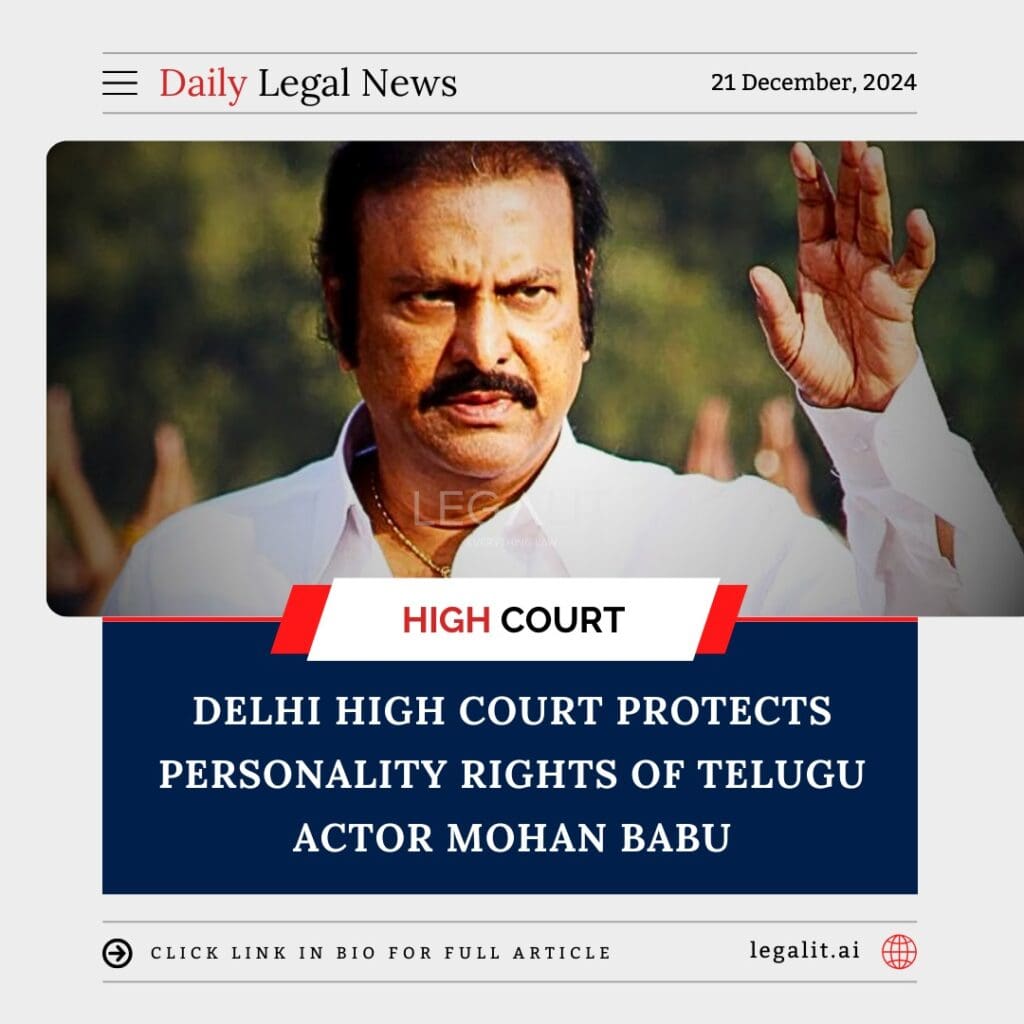
In a landmark judgment, the Delhi High Court recently upheld the personality rights of renowned Telugu actor Mohan Babu, offering legal protection against the unauthorized use of his name, image, and likeness. The case emphasized the importance of safeguarding an individual’s personality rights, particularly for celebrities and public figures, from being exploited without consent. The court’s decision has significant implications not only for the entertainment industry but also for the broader legal framework surrounding intellectual property rights.
Background
Mohan Babu, a well-known actor in the Telugu film industry, filed a petition in the Delhi High Court seeking protection against the unauthorized use of his name and likeness by certain companies and individuals. The actor argued that his personality, reputation, and public image were being misused for commercial gain without his permission. He claimed that various products and advertisements were using his name, image, or references to his persona without his consent, thereby infringing upon his personality rights.
The petition highlighted that celebrities, like any other individual, have the right to control the use of their name, image, and likeness. Mohan Babu’s legal team argued that such unauthorized use not only harmed his reputation but also deprived him of the ability to profit from his own identity.
Key Arguments
Protection of Personality Rights
- Right to Control One’s Image: Mohan Babu’s counsel emphasized that personality rights are essential for public figures who rely on their image for their professional and personal livelihood. The unauthorized use of an actor’s name or likeness without consent can lead to both financial loss and harm to reputation.
- Infringement of Rights for Commercial Gain: The petitioners argued that unauthorized commercial use of a celebrity’s name or image amounts to an infringement of personality rights. They highlighted that without consent, such practices are tantamount to exploiting an individual’s persona for profit.
Precedents in Personality Rights Law
- Protection Under Intellectual Property Law: The legal team for Mohan Babu referred to previous rulings in similar cases that had affirmed the protection of personality rights under the umbrella of intellectual property law. The petition underscored that celebrities’ rights are not limited to traditional intellectual property, such as trademarks or copyrights, but extend to their persona, which can be used commercially in various forms.
- Public Interest and the Right to Privacy: The case also touched upon the balance between the public’s interest in knowing about public figures and the individual’s right to privacy. The counsel for Mohan Babu argued that while celebrities are in the public eye, their image should not be used recklessly or without their permission for commercial purposes.
Legal and Policy Implications
Strengthening Personality Rights in India
- Broader Legal Protection for Public Figures: This case signals a growing recognition of personality rights in India, especially for actors, athletes, and other public figures. The ruling could set a precedent for stronger legal protections for celebrities whose names and images are frequently used in advertising and commercial ventures without consent.
- Guidance for Future Disputes: The Delhi High Court’s ruling will likely provide guidance for future cases involving unauthorized use of personality rights. The judgment clarifies that even though a public figure may be in the public eye, their identity and persona remain protected by law, and any commercial use must be accompanied by consent or compensation.
Impact on the Entertainment and Advertising Industry
- Commercial Use of Celebrities’ Likeness: The case could influence how the entertainment and advertising industries approach the use of public figures in their campaigns. Companies may be more cautious in using a celebrity’s image or name without formal agreements, knowing that they could face legal consequences.
- Rise in Personality Rights Claims: As awareness of personality rights grows, other public figures may follow in Mohan Babu’s footsteps and seek legal remedies for unauthorized use of their persona. This could lead to an increase in lawsuits aimed at protecting the image and identity of celebrities across various sectors.
Conclusion
The Delhi High Court’s ruling in favor of Mohan Babu underscores the importance of protecting personality rights in India, particularly for public figures whose names and images are often exploited for commercial gain. This judgment is a significant step forward in recognizing the legal rights of individuals over their personal image and likeness. It not only strengthens the intellectual property laws but also offers a clearer legal pathway for other public figures who wish to protect their persona from unauthorized use. The decision is expected to have a far-reaching impact, not just on the entertainment industry but also on the broader landscape of personality rights in India.